毕业论文申报表、任务书、开题报告格式

毕业设计(论文)开题报告书
课 题 名 称 探析情感教育在中学思想政治课中的运用 学 生 姓 名 ** 学 号 系、年级专业 政法系09级思想政治教育专业 指 导 教 师 ****
20xx年 1月 8日
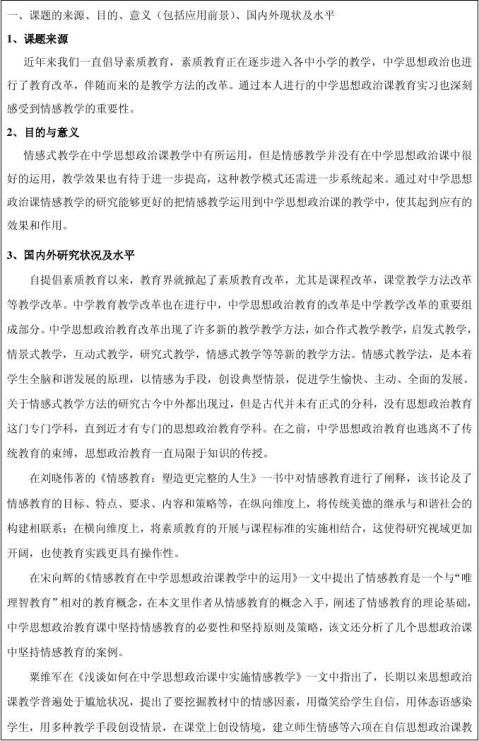
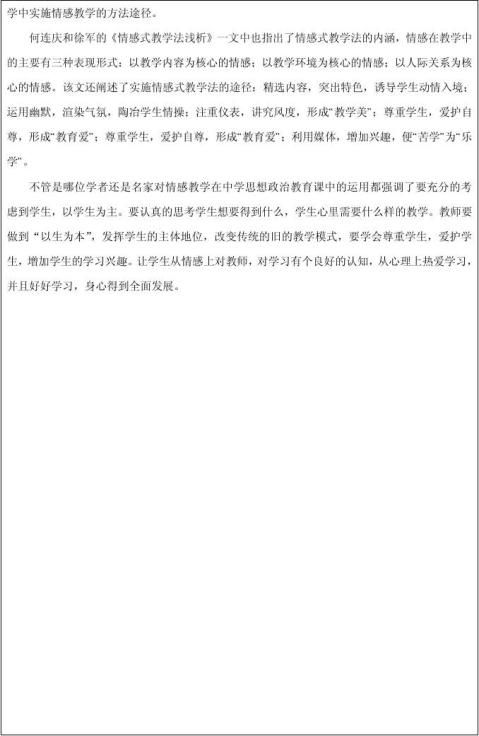
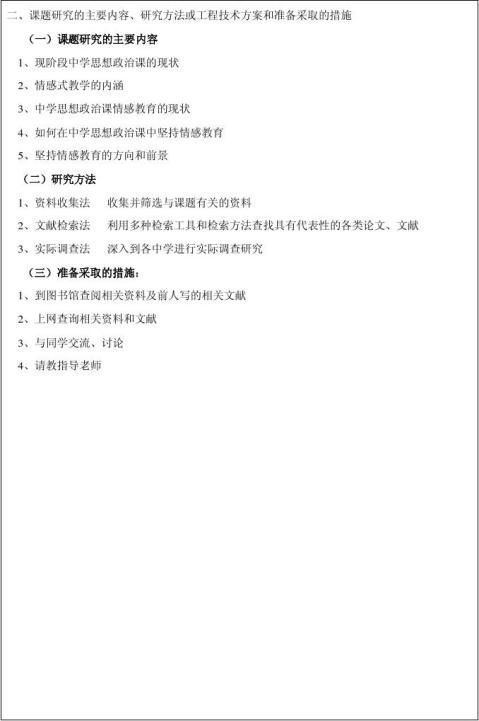
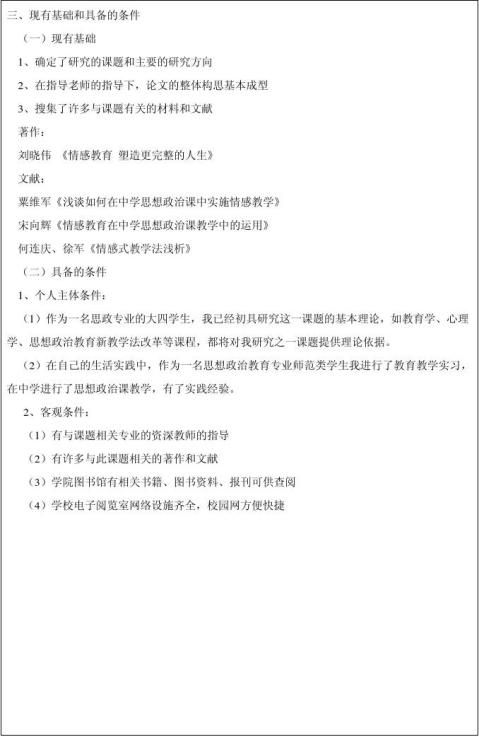
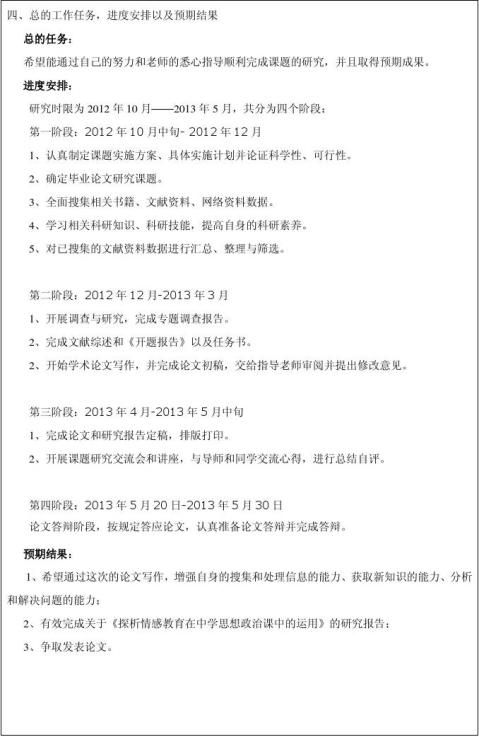
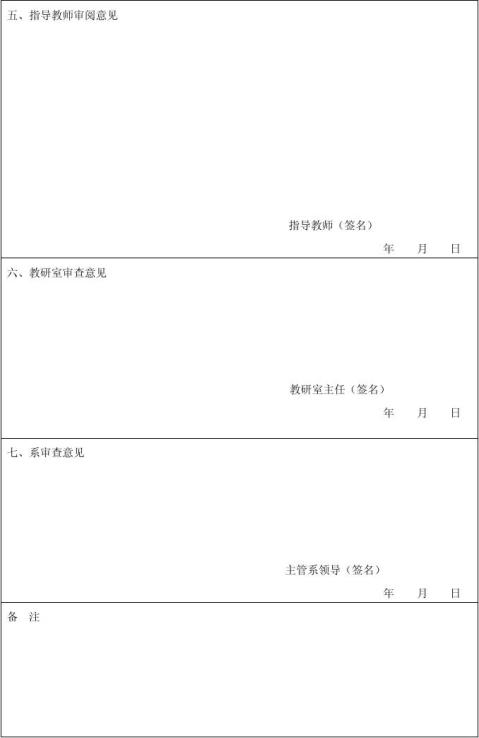
邵阳学院毕业设计(论文)任务书
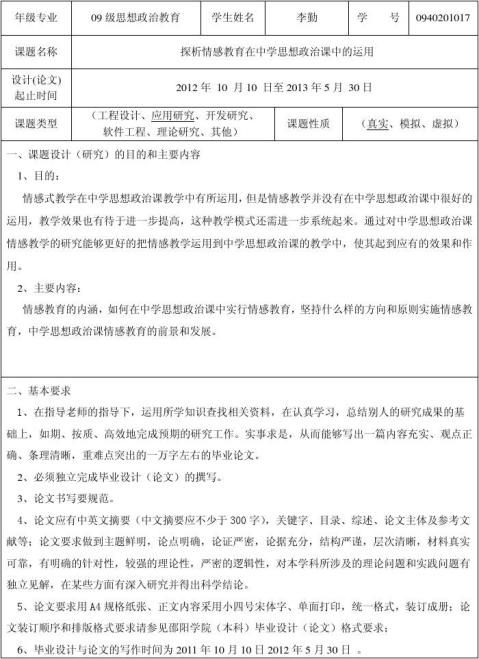
注:此表由指导教师填写,经各系、教研室主任审批,指导教师、学生签字后生效。
指导教师(签字): 学生(签字):
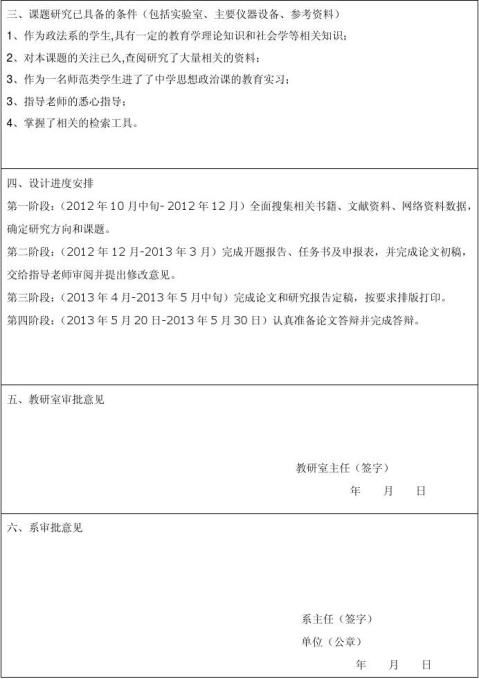
邵阳学院毕业设计(论文)课题申报表
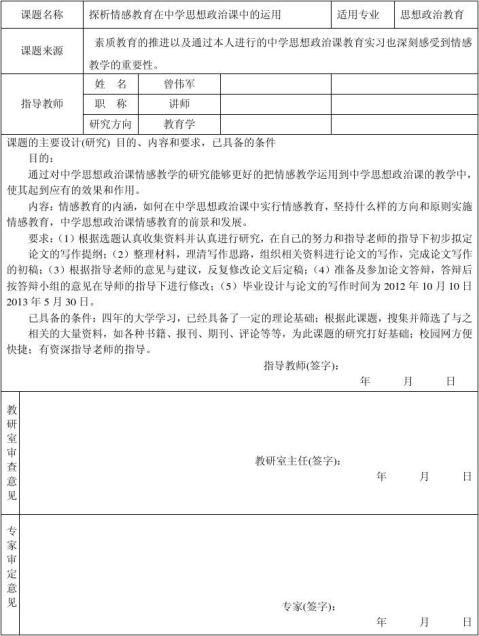
注:1、此表由申报毕业设计(论文)课题的老师填写;2、此表1式3份。教务处、学生所在系、专业教研室各1份
第二篇:毕业论文开题报告与任务书参考范本 Microsoft Word 文档
2009届毕业设计(论文)课题任务书
学院(部):外国语学院 专业: 英语
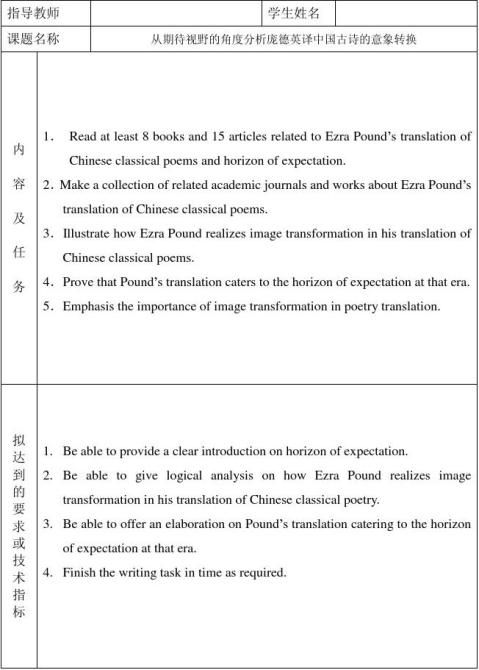
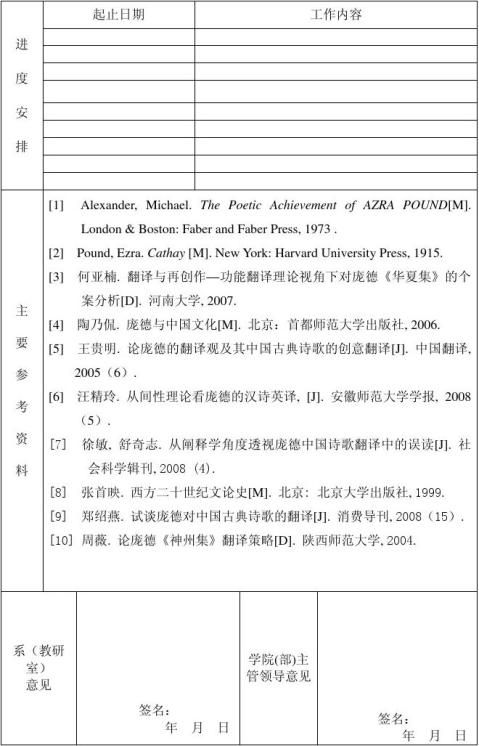
湖 南 工 业 大 学
本科毕业设计(论文)开题报告
(2009届)
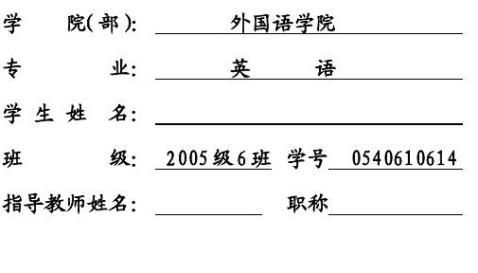
20xx年12 月 18日
题目:从期待视野的角度分析庞德英译中国古诗的意象转换
Analysis on Image Transformation of Chinese Classical Poems
Translated by Ezra Pound from Perspective of Horizon of Expectation
1. 结合课题任务情况,查阅文献资料,撰写1000-2000个左右英文单词的文献综述
Analysis on Image Transformation of Chinese Classical Poems Translated by Ezra Pound from Perspective of Horizon of Expectation
Survey of studies
Ezra Pound, an American poet and translator, is an initiator of Imagism—an Anglo-American movement in poetry at the beginning of the twentieth century. As a translator, Pound’s English renderings of Chinese classical poems own extremely high position in the history of literature, but meanwhile, they are also a heatedly debated field in the translation circle, particularly his slim anthology entitled Cathay, translations of 19 Chinese classical poems, which makes its first appearance in 1915. Its philological errors often fall under some critics’ attack, while the creative translation in image transformation and its distinct foreign flavor win others’ praise. Until now, many Chinese scholars have done lots of researches on Pound’s translation of Chinese classical poems.
Zhou Wei made her comment on Pound’s translation strategies in Cathay in 2004. In her view, Cathay is an anthology of successfully translated poems judged in the Skopostheorie framework. Its adequacy to Pound’s translation brief, the warm reception by the Western readers and its influence on American literature all prove the success of Cathay. It is further drawn that poetry translation is an allusion, the translator, under the guidance of translation brief, will and should decide what to translate and how to translate, which elements to be preserved and which to be removed. Thus a translated text can be adequate to the translation brief. As to evaluate
the achievements of a translated text, linguistic “equivalence” is no longer the only yardstick. Its adequacy to translation brief, the fulfillment of the intended Skopos, and its influence on a given culture should all be taken into consideration. Translation criticism should extend its scope to cover more factors relevant to translation activities.
In 2005, Wang Guiming investigated Pound’s conception and his creative translation of Chinese classical poems. He believes Ezra Pound has contributed significantly to the growth of translation worldwide and given considerable impetus to the development of modernist poetry in English, in his capacity as both a theorist and a practitioner of translation, particularly with his creative translation of Chinese classical poems into English.
In the year of 2007, He Yanan cast a new light on Ezra Pound’s creativeness in his translation Cathay of Chinese classical poems by an elaborated analysis in the perspective of functionalist approach focusing on translation and re-creation. He also holds that Cathay has enjoyed enormous popularity in the West and assumed a unique position in the history of English translation of Chinese classical poems.
During 2008, Zheng Shaoyan points out that the birth and development of imagism poems are under great influence of Chinese classical culture, especially Chinese poems. She also believes that Chinese classical culture has remarkable impact on Pound in the process of his translation of Chinese classical poems and learning of Chinese. What’s more, she holds that although this outstanding poet and scholar makes misreading and misinterpretation which cannot be ignored because of cultural differences due to different cultural background in the East and the West, Pound’s wisdom and intelligence is still evident to be seen.
Xu Min and Shu Qizhi (2008) studied misreading of Pound’s translation of Chinese classical poems in the perspective of hermeneutics. They make an explanation of Pound’s misreading in the perspective of hermeneutics prejudice and misinterpretation theory and explore the internal and external reasons of Pound’s misreading in the selection of texts and the translation and practice of imagery poems, concluding that Pound’s misreading is the result of dual effect of social, cultural
factors and the aim of the translator. They suggest that Pound’s creative misreading should be shown a positive attitude to in the perspective of promoting cultural exchange and strengthening communication and integration of western and eastern culture.
Wang Jingling also studied Pound’s translation of Chinese poetry from the perspective of Inter-Theory in the same year. She claims that from the perspective of translator’s intersubjectivity, Pound converts the interaction between the translation subject and object into that between the translator and original text writer, patron, or other translator. She brings about the idea that from the perspective of target text’s intertextuality, Pound doesn’t confine himself to the original text but reconstructs it; what he has finished is the inter-dialogue between the target text and original text, quotations or other renderings. Pound’s translation of Chinese poetry can be considered as a good example of interaction, no matter in the history of translation or history of cultural exchange.
In 2008, Zhai Ping analyzed Pound’s misinterpretation in the perspective of Reception Aesthetics. She tries to find the reason of Pound’s misinterpretation and illustrates that Pound’s misinterpretation is induced by integrated variables relevant to the vertical-horizontal reception form, such as aesthetic subject (translators) and reception subject (target language readers) and reception environment (national psychology of target language).
Because people are not familiar with Horizon of Expectation, and it has not received enough attention, let alone the research on image transformation in Chinese classical poems translated by Pound in this perspective. As a result, in China, the ongoing study on this topic is still not systematic and comprehensive, which blocks and influences people’s objective view on Pound’s translation of Chinese classical poems.
Although many researchers in China and in foreign countries have set foot in the analysis of Pound’s translation of Chinese classical poems into English, each of them approaches it in his own way without keeping abreast of what others are doing on the same research object and there still exist limitations of the study of Pound’s
translation of Chinese classical poems. The former studies which haven’t combined image transformation in Pound’s translation of Chinese classical poems with Horizon of Expectation may cause many misunderstandings which cannot make people achieve a better and deeper understanding of Pound’s translation objectively. So this study combines these two aspects to carry out a systematic study of image transformation in Chinese classical poems translated by Pound in this new perspective. Besides, the author intends to highlight the importance and features of image in the process of poetry translation.
Thesis statement
A lot of researches have been done on Ezra Pound’s translation of Chinese classical poems into English. But the study of this has seldom been associated with Horizon of Expectation, let alone Pound’s translation. So it is necessary to give a research on image transformation in Pound’s translation of Chinese classical poems into English from the perspective of Horizon of Expectation.
This study aims to illustrate that Pound’s creative translation caters to the horizon of expectation at that era through analyzing image transformation in his translation of Chinese classical poems, especially in Cathay. The thesis consists of five parts.
The first part is an introduction. It shows readers something brief about Pound and brings about the topic.
The second part mainly provides an overview of Ezra pound, Imagism, Horizon of Expectation and Chinese classical poems.
The third part analyzes how Pound achieves image transformation in his translation of Chinese classical poems. This part mainly talks about two methods: using visual art and employing creative transformation.
The fourth part concerns with horizon of Expectation. Firstly, Pound’s version of translation of Chinese classical poems caters to people’s need at that era. Secondly,
Pound’s translation brings new life into English literature. Thirdly, Pound’s translation is widely accepted in the West.
The final part serves as a conclusion. It draws a conclusion that Pound’s translations of Chinese classical poems in Cathay are successful image transformation from the perspective of horizon of expectation.
Outline of the paper
1 Introduction
2 Ezra Pound, Imagism, Chinese Classical Poems and Horizon of
Expectation
2.1 Pound and Cathay
2.2 Imagism and Chinese Classical Poems
2.3 Horizon of Expectation
3 Pound’s Realization of Imago Transformation in Translating Chinese Poetry
3.1 Using Visual Arts to Demonstrate Image
3.1.1 Employment of Shape
3.1.2 Employment of Color
3.1.3 Superposition
3.2 Using Creative Translation to Achieve Image Transformation
3.2.1 Ingenious Disposal of Key Words
3.2.2 Connotative Expression
3.2.3 Meter
4 Pound’s Translation Catering to the Horizon of Expectation
4.1 Pound’s Translation Meeting People’s Psychological Need during War Time
4.2 Pound’s Translation Bringing New Life into English Literature
4.3 Pound’s Translation Widely Accepted in the West
5 Conclusion
2.选题依据、主要研究内容、研究思路及方案
(1) The reasons that this topic is chosen are:
1) As an important part of Chinese poetry translation, Pound’s translation of Chinese classical poems causes arguments and it is necessary to deal with it objectively.
2) Image is the soul of Chinese classical poems. Therefore, the translator’s contribution to image transformation plays an essential role in poetry translation.
3) Analysis on Pound’s translation of Chinese classical poems in the perspective of Horizon of Expectation calls for further understanding. The author is interested in this topic.
(2) The main content of the paper is as follows:
The paper elaborates image transformation in Chinese classical poems translated by Ezra Pound through exploring into some examples, especially in Cathay. The author proves that Pound’s translation caters to the horizon of expectation at that era objectively, and emphasizes the importance of image transformation in poetry translation.
(3) To finish the thesis, it is important to process as follows:
1) Find major theories and collect the information about Ezra Pound and his translation of Chinese classical poems, Imagism, Chinese classical poems, and Horizon of Expectation.
2) Elaborate Pound’s image transformation in his translations, particularly in Cathay.
3) Prove that Ezra Pound’s image transformation in Chinese classical poems caters to the horizon of expectation at that era.
4) Emphasis the importance of image transformation in poetry translation.
3.工作进度及具体安排
(1) 20xx年11月7日前,选好指导老师。
(2) 20xx年11月21日前,在老师的指导下确定论文题目。
(3) 20xx年11月中旬,根据教师下达的任务,进行大量阅读和资料搜集。
(4) 20xx年12月22日前,在老师的指导下写好开题报告上交学院。
(5) 20xx年2月16日—4月6日为毕业实习时间。
(6) 20xx年4月6日返校,交实习日记和实习总结报告。
(7) 20xx年4月24日前,交论文初稿。
(8) 20xx年5月8日前,交第一修改稿。
(9)20xx年5月22日前,交第二修改稿。
(10)毕业论文上交截止日期为5月29日。
4.指导教师意见
指导教师:
200 年 月 日
说明:开题报告作为毕业设计(论文)答辩委员会对学生答辩资格审查的依据材料之一,此报告应在导师指导下,由学生填写,将作为毕业设计(论文)成绩考查的重要依据,经导师审查后签署意见生效。
-
大学毕业论文开题报告格式
毕业论文开题报告题目宋体三号居中学院全称宋体三号居中专业专业如材料化学宋体三号居中班级宋体三号居中如材化0601学生宋体三号居中学…
-
毕业论文开题报告范文
[1]毕业论文开题报告开题报告是指开题者对科研课题的一种文字说明材料。这是一种新的应用写作文体,这种文字体裁是随着现代科学研究活动…
-
毕业论文开题报告模板
毕业设计论文开题报告题目从网络游戏产业问题看信息业的新趋势姓名学号指导教师班级系部陕西科技大学镐京学院毕业设计论文开题报告陕西科技…
-
开题报告格式及范文模板(最全面,最实用)
1开题报告方法介绍开题报告是指开题者对科研课题的一种文字说明材料这是一种新的应用写作文体这种文字体裁是随着现代科学研究活动计划性的…
-
毕业论文开题报告格式及范文
学位论文开题报告审批表开题报告人姓名丁春光申请学位类别管理学学士所在院系文法学院年级08级学科专业公共事业管理拟定题目大学生自主创…
-
毕业论文开题报告范文
[1]毕业论文开题报告开题报告是指开题者对科研课题的一种文字说明材料。这是一种新的应用写作文体,这种文字体裁是随着现代科学研究活动…
-
毕业论文开题报告和中期检查表参考模板
长春师范学院本科毕业论文设计开题报告学院数学学院专业数学与应用数学长春师范学院本科毕业论文设计中期检查表学院数学学院专业数学与应用…
-
毕业论文(开题报告)样式
毕业设计论文题目中国当代艺术中符号性语言的发现与运用净空茶舍VI设计学生院系艺术学院班级艺设20xx班指导教师辅导教师时间20xx…
-
毕业论文开题报告模板
毕业设计论文开题报告题目从网络游戏产业问题看信息业的新趋势姓名学号指导教师班级系部陕西科技大学镐京学院毕业设计论文开题报告陕西科技…
-
环艺毕业设计开题报告书
本科毕业设计设计报告开题报告书题目在水之尚水上别墅设计院系艺术学院姓名XX学号0811XXXX指导教师XXX职称讲师年级专业20x…
-
江西省党建课题申请书范例
附件1A表江西省高校党建研究项目申请书项目类别:青年项目研究方向:党的创新理论研究项目名称:民办高校学生党建工作创新性实践研究项目…